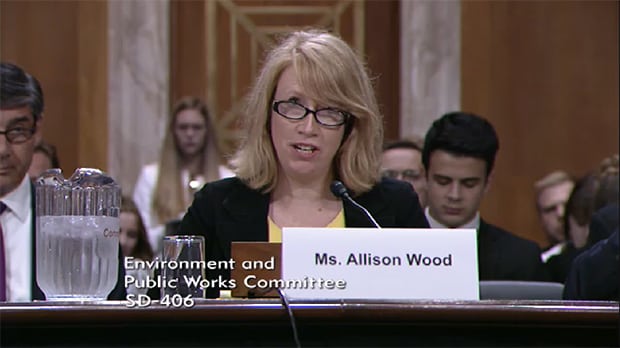How Will the Supreme Court Stay Affect the Clean Power Plan?
One of the witnesses testifying before the U.S. Senate Committee on Environment and Public Works on June 9 believes states and regulated entities will be granted additional time to comply with the Environmental Protection Agency’s (EPA’s) Clean Power Plan (CPP), if the rule is ultimately found to be lawful.
Currently, the U.S. Supreme Court has granted a stay of the rule, which means that the CPP, although finalized, has no legal effect. A stay of an administrative action maintains the status quo during the time that the court considers the legality of the action. Any and all obligations are effectively void and neither states nor regulated entities can be penalized for refusing to comply with any requirement or deadline in the rule.
Unusual Situation
According to Allison Wood, partner in the law firm Hunton & Williams LLP and one of the witnesses at the hearing (Figure 1), stays of federal regulations are very rarely granted by any court. She said the Supreme Court only grants a stay when there is a reasonable probability that four justices would consider the issue one on which they would grant review, there is a fair prospect that a majority of the court would vote to strike down the rule at issue, and there is a likelihood that irreparable harm would result without a stay. In order for the stay to have been granted, at least five of the nine justices on the court at the time had to find that all three factors were present.
 |
| 1. Allison Wood testified during a Senate hearing on June 9, 2016. Source: U.S. Senate Committee on Environment and Public Works |
Sen. Dan Sullivan (R-Alaska) said that his staff had done research on past Supreme Court practices and found that this is the first time the Supreme Court has placed a stay or injunction on a federal regulation before a lower court had ruled on the case’s merits. Sullivan then pointed to a now-famous response offered by EPA Administrator Gina McCarthy when asked during a June 26, 2015, interview on the HBO series “Real Time with Bill Maher” about the imminent Supreme Court decision on the agency’s Mercury and Air Toxics Standards rule.
“We think we’re going to win, because we think we did a great job on [the rule],” McCarthy said at the time. “But even if we don’t, it was three years ago, most of [the power plants] are already in compliance, investments have been made, and we’ll catch up. And we’re still going to get at the toxic pollution from these facilities.”
Sullivan noted, “So she’s saying, ‘Even if we lose in court, we win anyways, because we promulgated this and the poor sucker companies have had to abide by it, even if they’re going to get the rule overturned.’”
Adjusting Deadlines
With that in mind, questions about deadlines and obligations required by the CPP have arisen. Wood said that typically all deadlines are tolled and are extended by the period of time of the stay. For example, if the stay were in effect for 500 days, she said all of the deadlines in the CPP would be extended by at least 500 days.
“This is exactly what has happened with other EPA rules that were the subject of a judicial stay,” Wood said.
According to Wood, tolling of all deadlines in the CPP was explicitly sought in some of the applications before the Supreme Court.
“Statements that insinuate that not all of the deadlines will be tolled have a deleterious effect on states and regulated entities who become fearful that if they do not continue to plan and work toward compliance with the Power Plan that they will not have enough time to do so if the rule is ultimately upheld by the courts,” Wood said. “This fear effectively negates the relief provided by the stay.”
Wood pointed to the Cross-State Air Pollution rule, which was stayed by the courts for a little more than two and a half years. Following the court’s decision, deadlines were extended by three years.
“States and regulated entities should be able to rest secure in the knowledge that if the Power Plan is ultimately upheld that all of the deadlines will reset and that they will not have any less time to prepare than they would have had in the absence of the stay. That is what status quo means,” said Wood.
If the Power Plan were ultimately found to be unlawful—which, prior to Antonin Scalia’s death, a majority of the Supreme Court had indicated was a fair prospect—then the CPP would be a nullity and have no legal effect.
(Editor’s note: Allison Wood was also a speaker at POWER’s legal affairs conference held in Las Vegas on December 7, 2015.)
—Aaron Larson, associate editor (@AaronL_Power, @POWERmagazine)